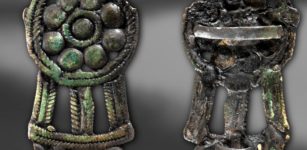What Was Pax Deorum And How Important Was It?
A. Sutherland - AncientPages.com - Pax Deorum ("peace of the gods") signified the central goal of the Roman state religion.
The Pax Deorum provided divine protection to the Roman Empire, which needed this kind of security as much as material protection from the army's side. Thus politics and religion cooperated.
Tellus Relief, Ara Pacis. Photo by kind permission of Dr. Janice Siegel
Also, all the citizens of Rome had to participate in the process. People had to provide the gods with worship and cult to obtain a mutually beneficial and satisfactory peace between Rome and its deities.
The gods, on the other hand, safeguarded Rome's public welfare.
In religious practice, the harmony or agreement between the divine and humans was the Pax Deorum, and it was only given in return for correct spiritual practice. Religious practice was critical because it secured the Pax Deorum and prevented divine retribution, which could strike the city of Rome anytime.
The Pax Deorum was a delicate affair. It could be easily broken by several errors in the performance of ritual, for instance, or religious faults and negligence, which resulted in the so-called "divine disharmony" (ira deorum) and the anger of the gods.
"The rupture in the Pax Deorum may be seen as rupturing the fundamental order of the Roman state, casting the society back into a transitional or liminal state, "a time and place of withdrawal from normal modes of social action…." (Orlin E. Foreign Cults in Rome: Creating a Roman Empire).
The Roman system of public divination was crucial for the society and "functioned to reassure the Romans that each action they undertook had the blessing of the gods; in this way, divination was an essential part of the Romans' belief that they were the most religious of all people and therefore had a special connection to the divine…", Orlin continues in his book.
The Pax Deorum was understood as the "Goodwill of the Gods" and was expressed in a perfect and harmonious relationship between Man (Rome and its people) and Divinity (all the gods worshiped by them).
Such good relation between the Romans (chosen people of the gods) and the heavens was expressed in several ways, such as festival arrangements, sacrifices, signs, wonders, and diverse statues, which were reminders of the Pax Deorum.
The Romans truly believed that the Pax Deorum would make it possible for them to come closer to gods and master the unknown, divine forces around them, and in consequence, they would be able to live successfully.
It's worth noting that the Pax Deorum was a concept that variations were practiced throughout history in other ages and cultures.
Written by – A. Sutherland AncientPages.com Staff Writer
Updated on April 25, 2023
Copyright © AncientPages.com All rights reserved. This material may not be published, broadcast, rewritten or redistributed in whole or part without the express written permission of AncientPages.com
Expand for referencesReferences:
Alston R. Aspects of Roman History, AD 14-117, Del 14–117
Orlin E., Foreign Cults in Rome: Creating a Roman Empire
More From Ancient Pages
-
 DNA Evidence For Early Contact Between Farmers And Pastoralists In Black Sea Region
Archaeology | Jul 20, 2023
DNA Evidence For Early Contact Between Farmers And Pastoralists In Black Sea Region
Archaeology | Jul 20, 2023 -
 Connection Between Alpha Draconis And Egyptians Pyramids Revealed
Archaeology | Jan 12, 2020
Connection Between Alpha Draconis And Egyptians Pyramids Revealed
Archaeology | Jan 12, 2020 -
 8 Billion People: How Different The World Would Look If Neanderthals Had Prevailed
Featured Stories | Nov 18, 2022
8 Billion People: How Different The World Would Look If Neanderthals Had Prevailed
Featured Stories | Nov 18, 2022 -
 The Hittites, Mysterious People Of A Thousand Gods – Collapse Of The Hittite Empire
News | Sep 9, 2015
The Hittites, Mysterious People Of A Thousand Gods – Collapse Of The Hittite Empire
News | Sep 9, 2015 -
 Has The Tomb Of The Real Santa Claus Been Found In Turkey?
News | Oct 5, 2017
Has The Tomb Of The Real Santa Claus Been Found In Turkey?
News | Oct 5, 2017 -
 Newly Described Species Of Dome-Headed Dinosaur May Have Sported Bristly Headgear
News | May 24, 2023
Newly Described Species Of Dome-Headed Dinosaur May Have Sported Bristly Headgear
News | May 24, 2023 -
 Remarkable 4,000-Year-Old Seahenge In Norfolk – What Was The Purpose Of The Bronze Age Monument?
Featured Stories | Jul 4, 2022
Remarkable 4,000-Year-Old Seahenge In Norfolk – What Was The Purpose Of The Bronze Age Monument?
Featured Stories | Jul 4, 2022 -
 Large Underwater Site That Was Home To 500,000 People About 14,000 Years Ago Identified Northwest Of Australia
Earth Changes | Jan 17, 2024
Large Underwater Site That Was Home To 500,000 People About 14,000 Years Ago Identified Northwest Of Australia
Earth Changes | Jan 17, 2024 -
 16 Dead Sea Scrolls Fragments Are Forgeries – U.S. Bible Museum Says
Artifacts | Mar 15, 2020
16 Dead Sea Scrolls Fragments Are Forgeries – U.S. Bible Museum Says
Artifacts | Mar 15, 2020 -
 Abundant Hominin Fossils Dating Back 300,000 Years Excavated In Hualongdong (HLD), East China
Evolution | Aug 7, 2023
Abundant Hominin Fossils Dating Back 300,000 Years Excavated In Hualongdong (HLD), East China
Evolution | Aug 7, 2023 -
 Silent Witnesses: Further Dark Secrets Of Batavia Shipwreck – Uncovered
Archaeology | May 11, 2023
Silent Witnesses: Further Dark Secrets Of Batavia Shipwreck – Uncovered
Archaeology | May 11, 2023 -
 Jizo – Protector Of Children, Travelers And Women In Japanese Mythology
Featured Stories | Dec 23, 2015
Jizo – Protector Of Children, Travelers And Women In Japanese Mythology
Featured Stories | Dec 23, 2015 -
 Why Did Vikings Burn And Bury Their Longhouses?
Ancient Traditions And Customs | May 3, 2017
Why Did Vikings Burn And Bury Their Longhouses?
Ancient Traditions And Customs | May 3, 2017 -
 4,000-Year-Old Serpent-Shaped Wooden Stick Unearthed in Southern Finland
Archaeology | Jun 30, 2021
4,000-Year-Old Serpent-Shaped Wooden Stick Unearthed in Southern Finland
Archaeology | Jun 30, 2021 -
 Gona, Ethiopia Discovery: Smallest ‘Homo Erectus’ Cranium In Africa And Stone Tools – Unearthed
Archaeology | Mar 5, 2020
Gona, Ethiopia Discovery: Smallest ‘Homo Erectus’ Cranium In Africa And Stone Tools – Unearthed
Archaeology | Mar 5, 2020 -
 The Helm Of Awe – Powerful Viking Symbol For Physical, Mental And Spiritual Protection
Ancient Symbols | May 25, 2018
The Helm Of Awe – Powerful Viking Symbol For Physical, Mental And Spiritual Protection
Ancient Symbols | May 25, 2018 -
 Rare Stone Showing Ancient Rome’s City Limits – Accidentally Found
Archaeology | Jul 18, 2021
Rare Stone Showing Ancient Rome’s City Limits – Accidentally Found
Archaeology | Jul 18, 2021 -
 2,000-Year-Old Celtic Dice Discovered In Poland
Archaeology | Oct 11, 2023
2,000-Year-Old Celtic Dice Discovered In Poland
Archaeology | Oct 11, 2023 -
 Hunter-Gatherer Metallurgy In The Early Iron Age Of Northern Fennoscandia Was Integrated And Advanced
Archaeology | Aug 15, 2023
Hunter-Gatherer Metallurgy In The Early Iron Age Of Northern Fennoscandia Was Integrated And Advanced
Archaeology | Aug 15, 2023 -
 Hidden Manuscripts Reveal Ancient Sacred Wisdom Of The Gods And Surprises
Ancient Mysteries | Mar 23, 2019
Hidden Manuscripts Reveal Ancient Sacred Wisdom Of The Gods And Surprises
Ancient Mysteries | Mar 23, 2019


